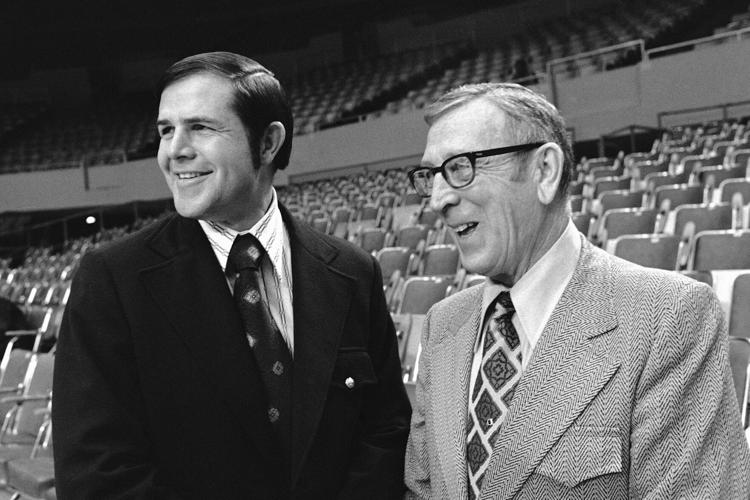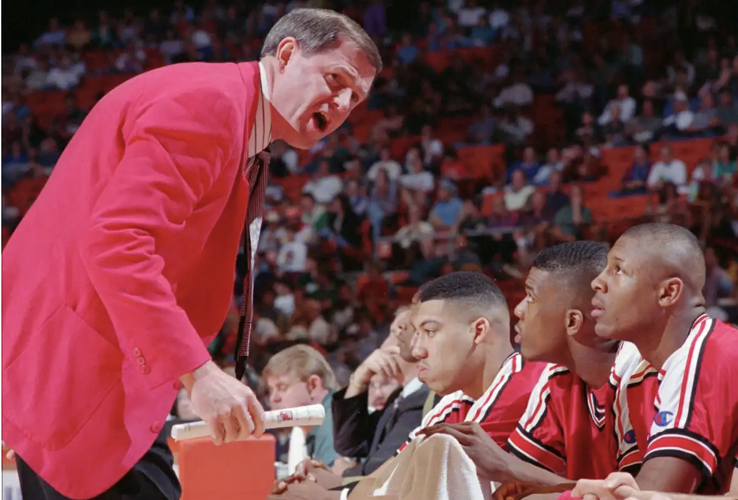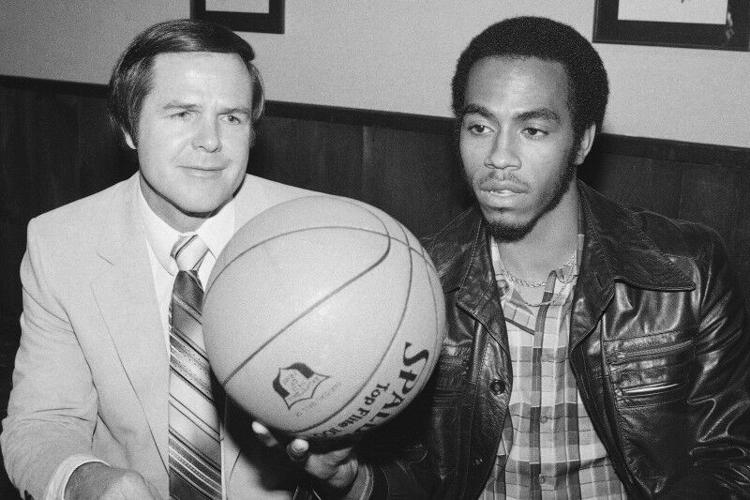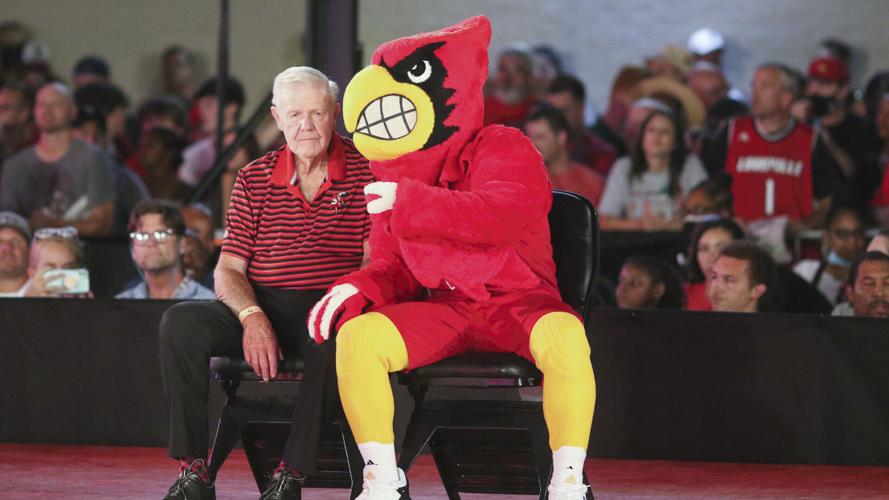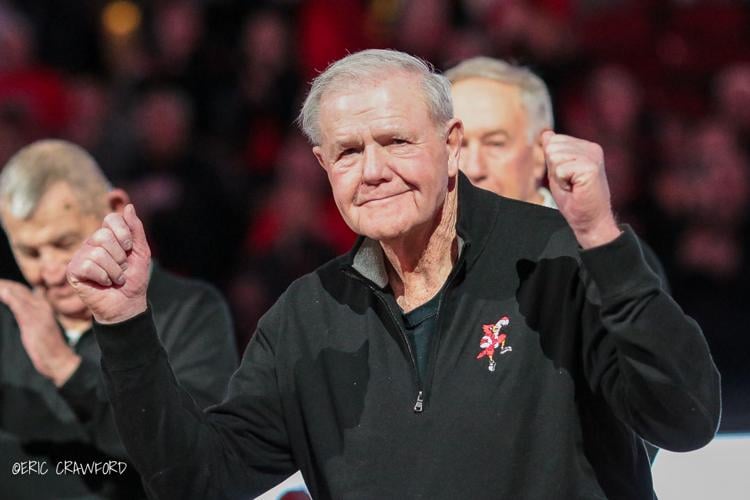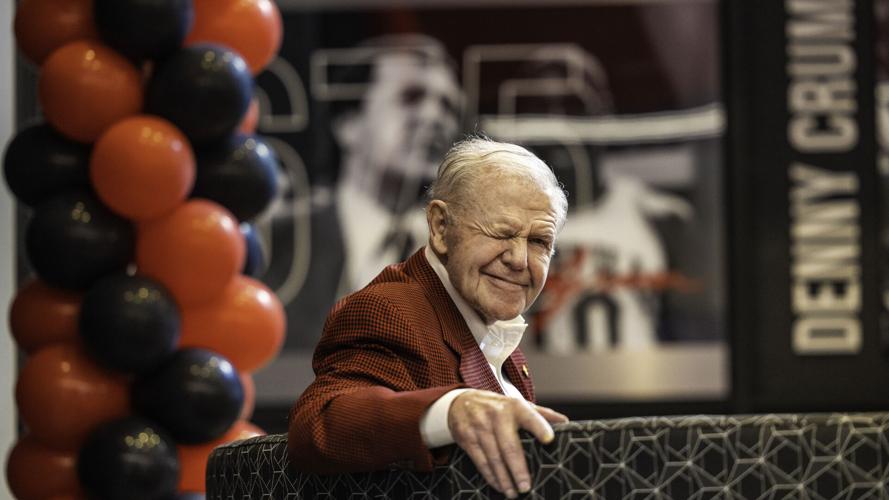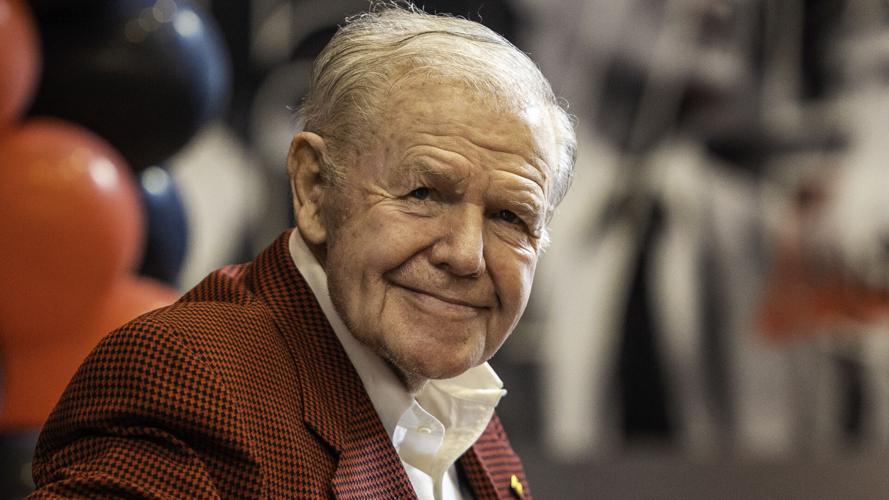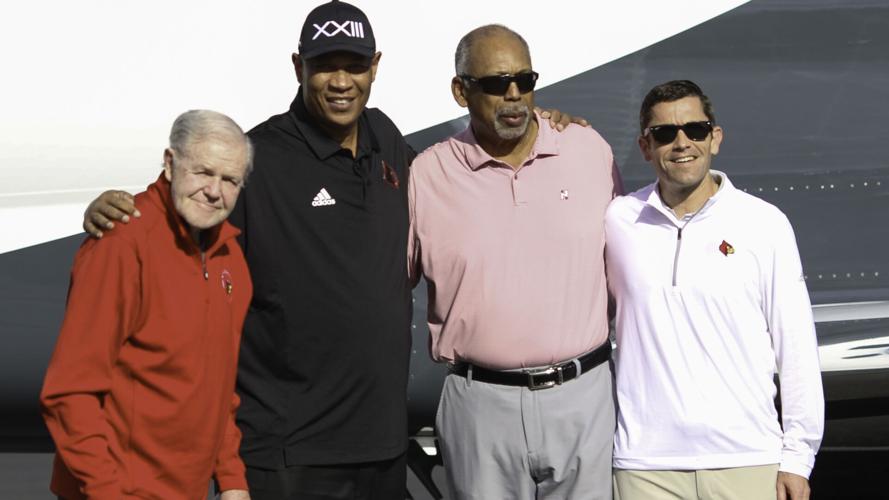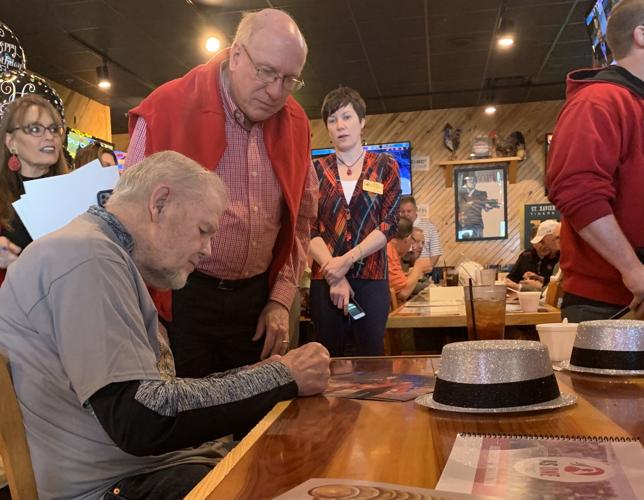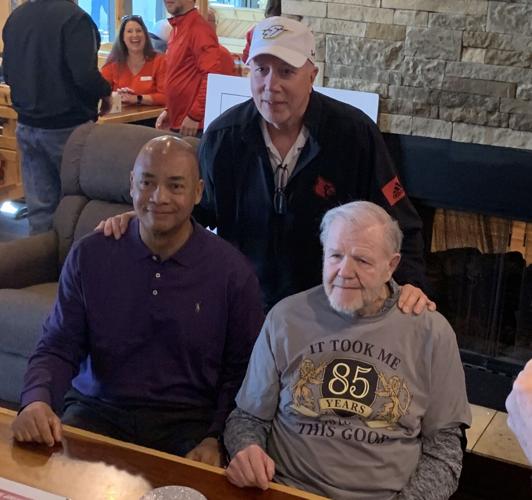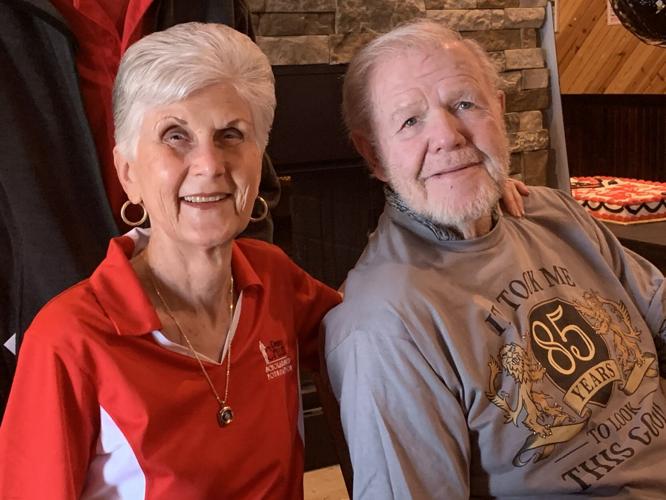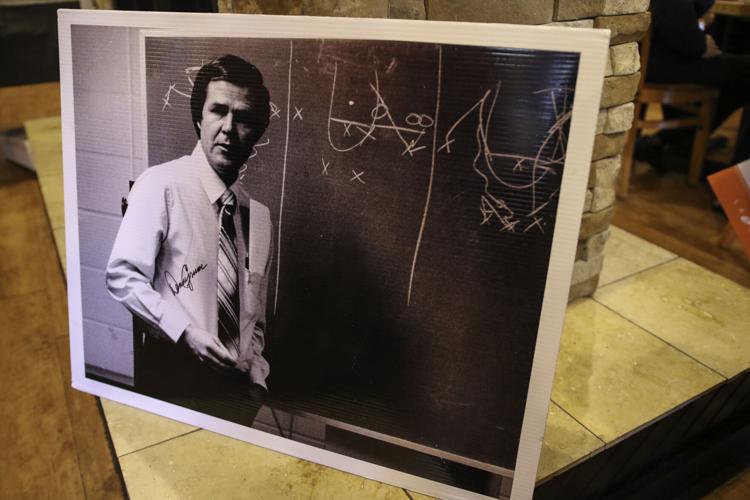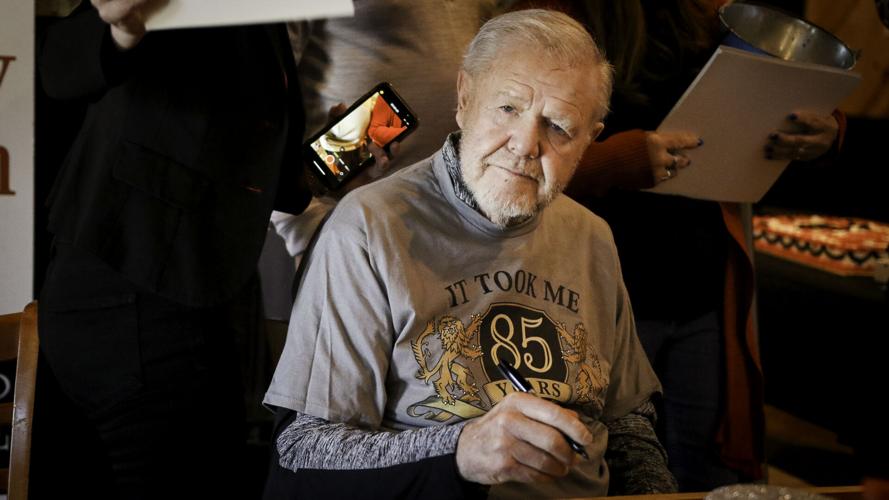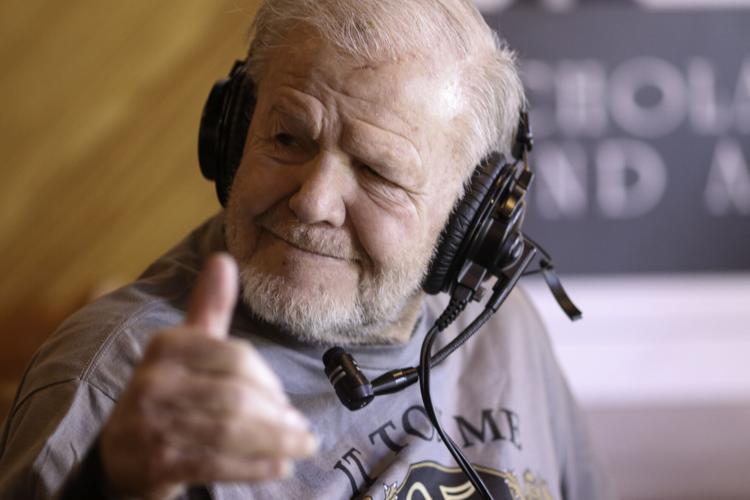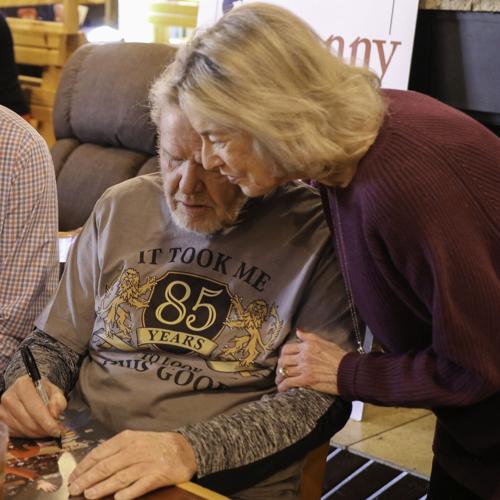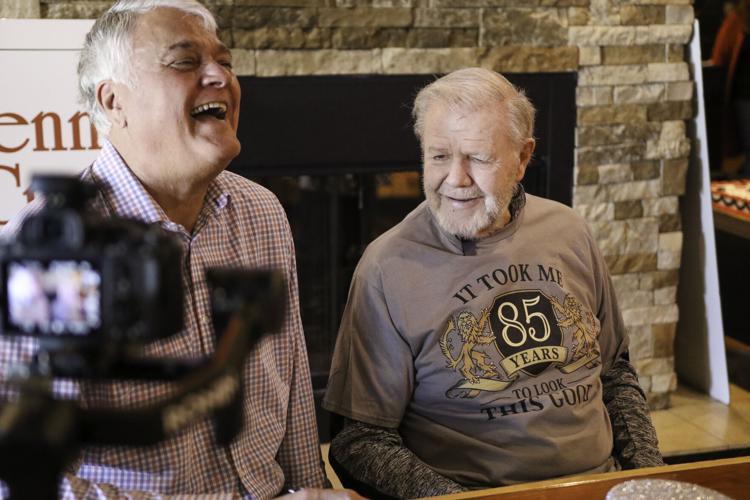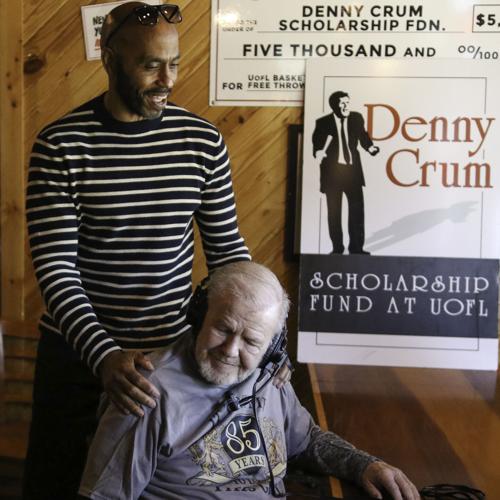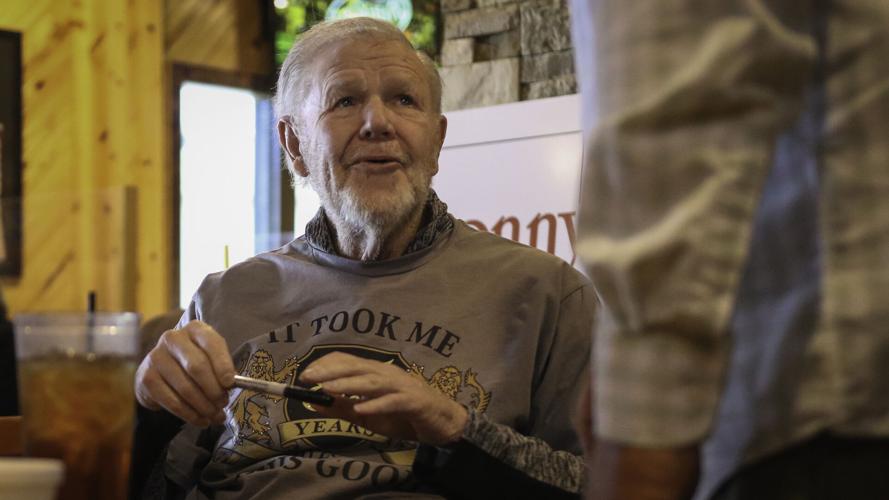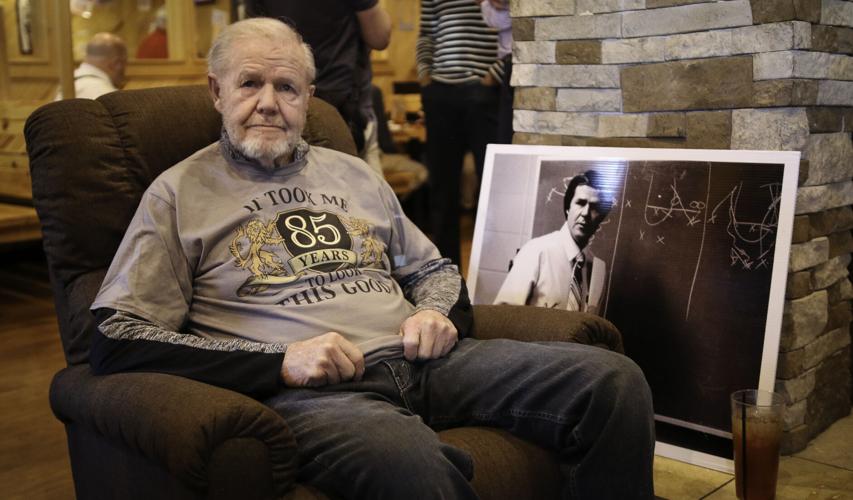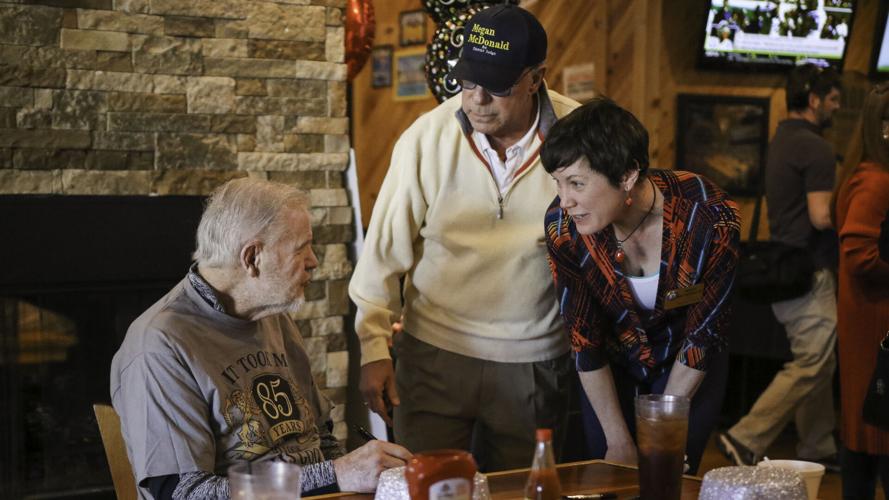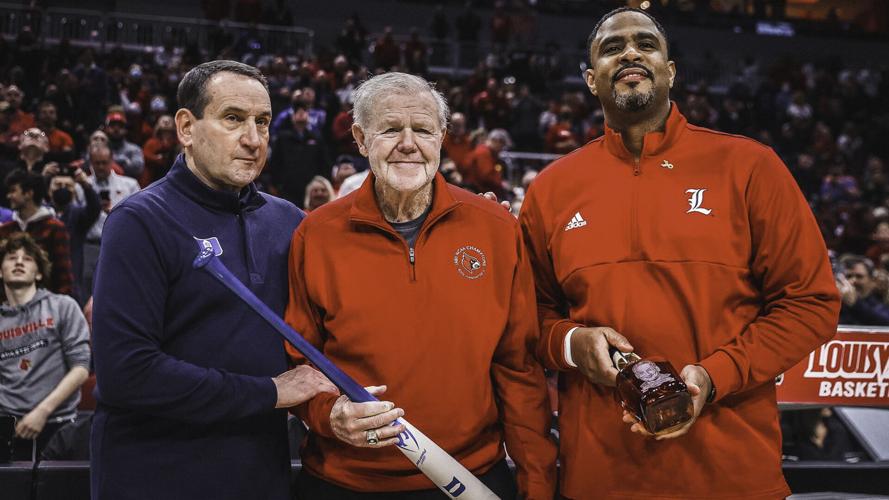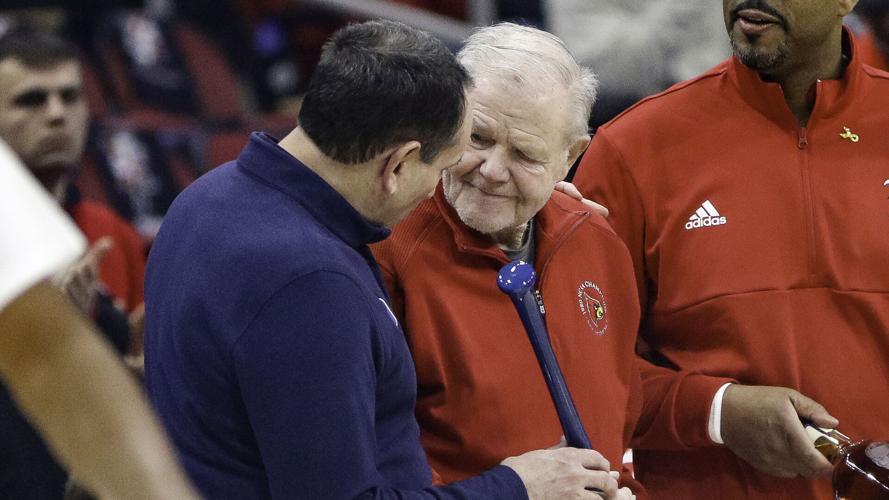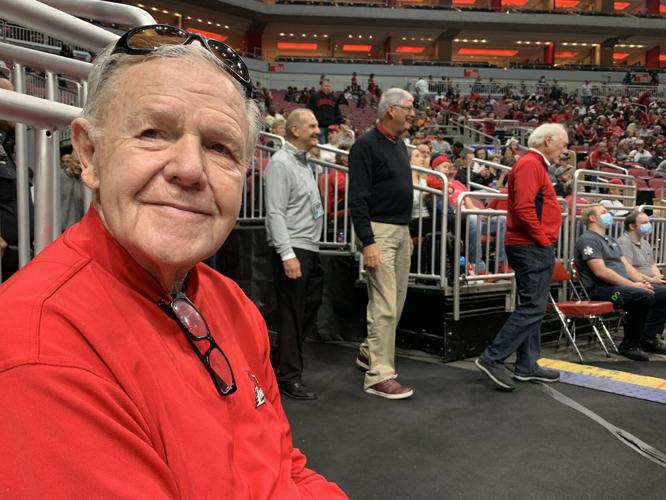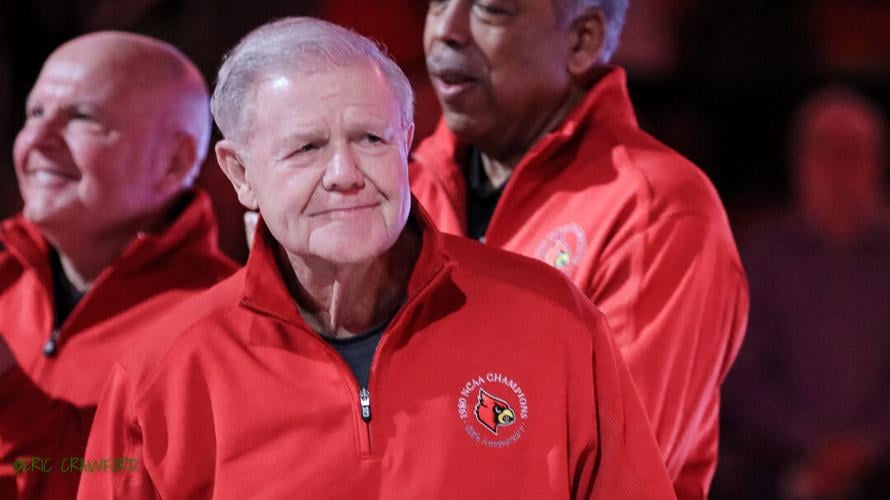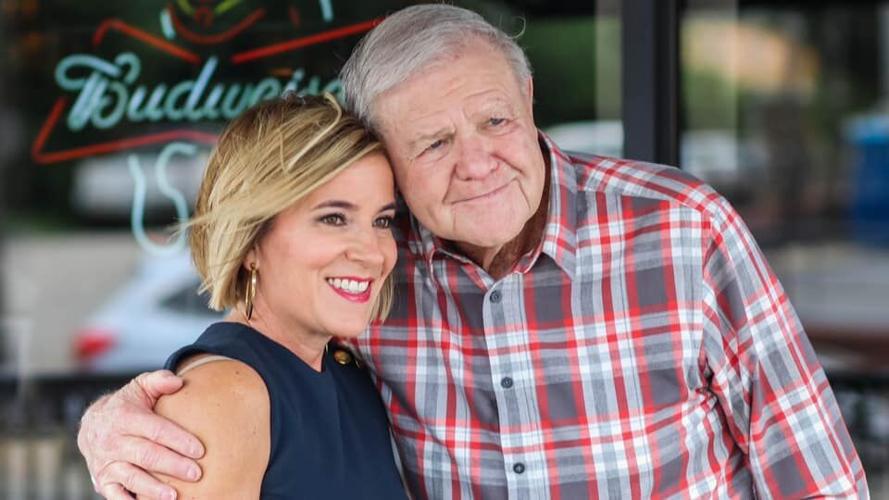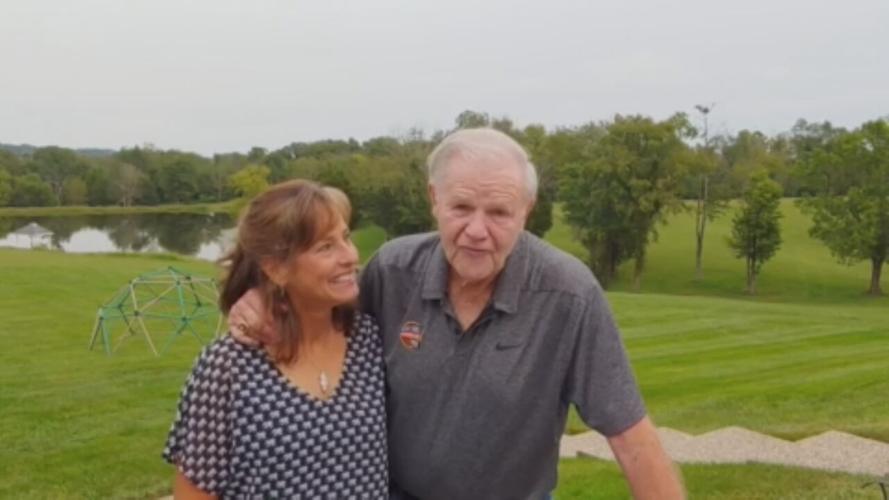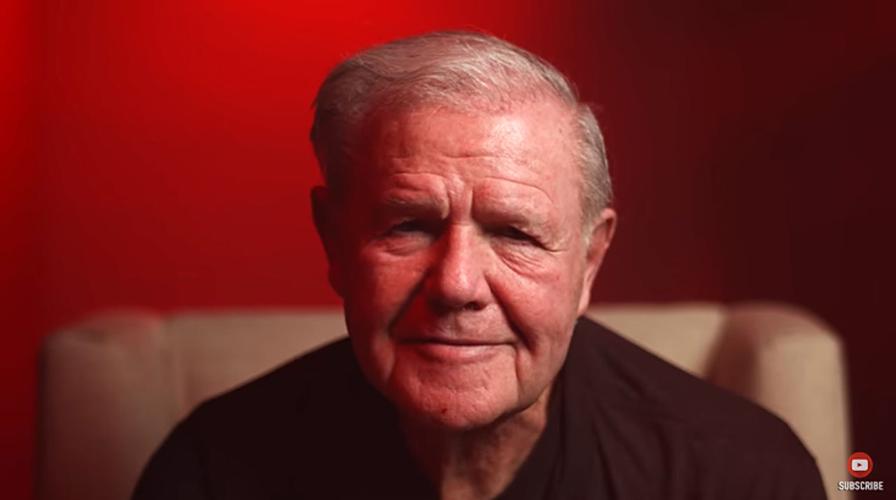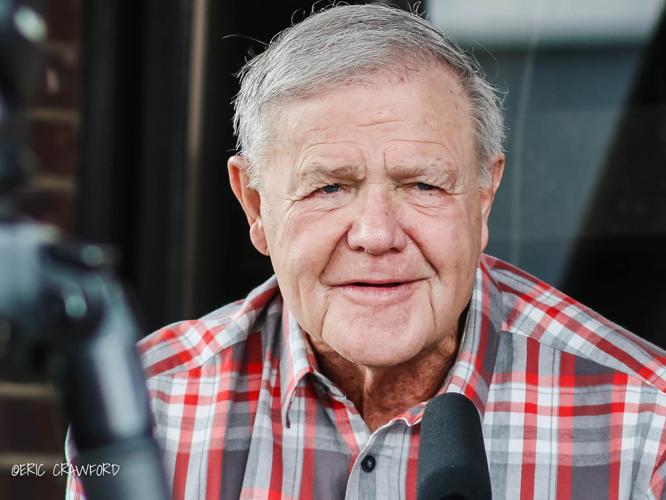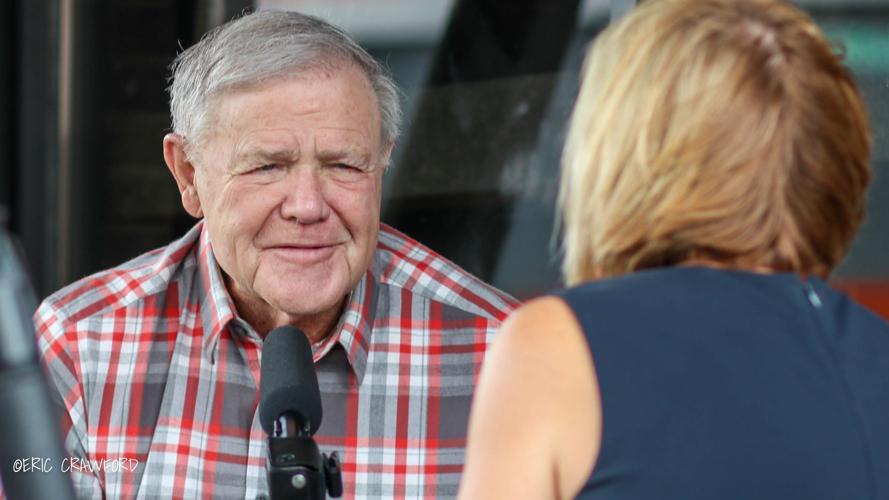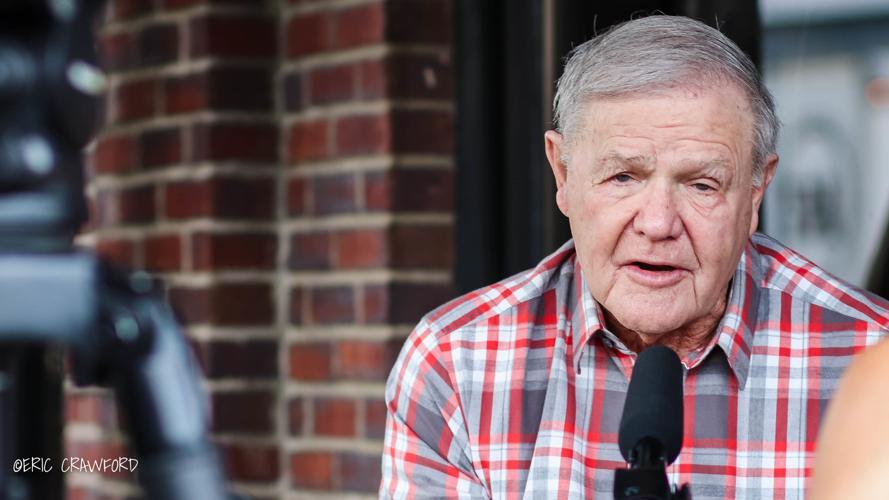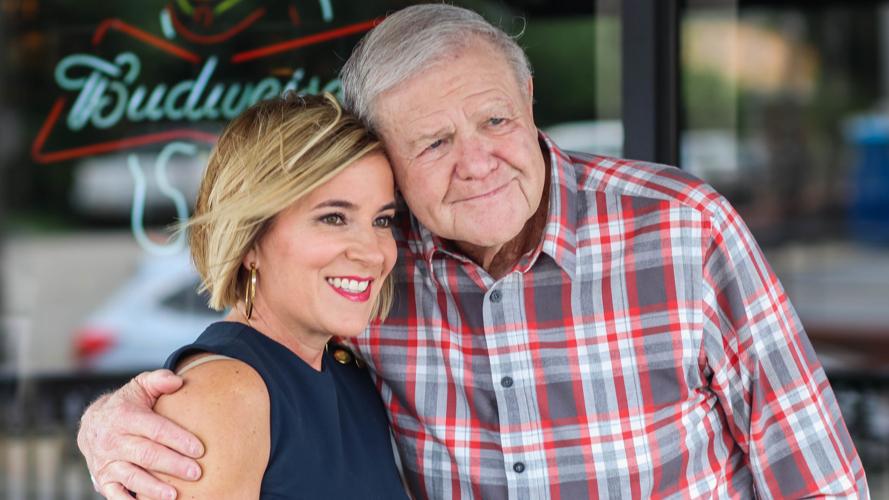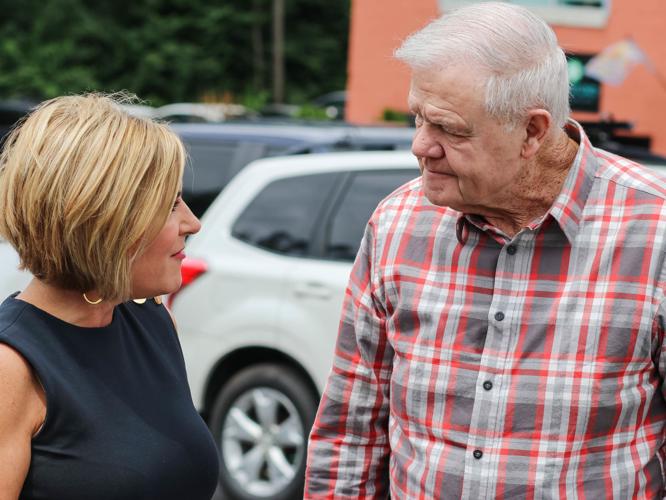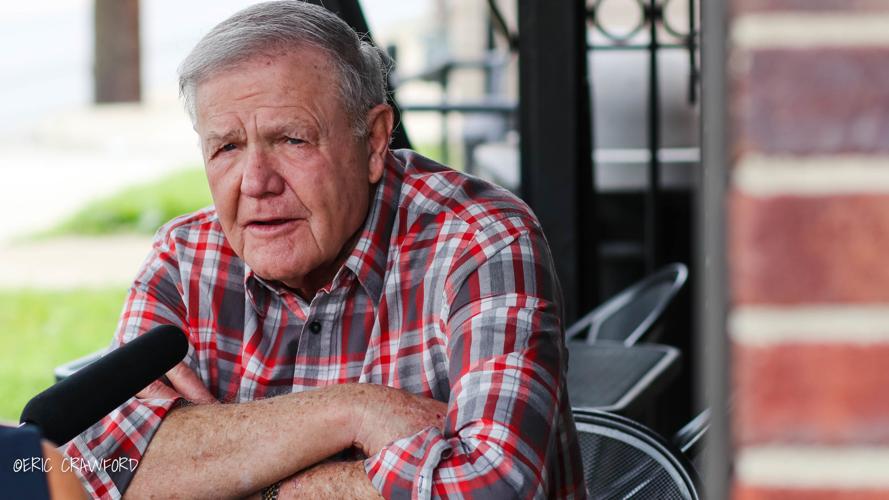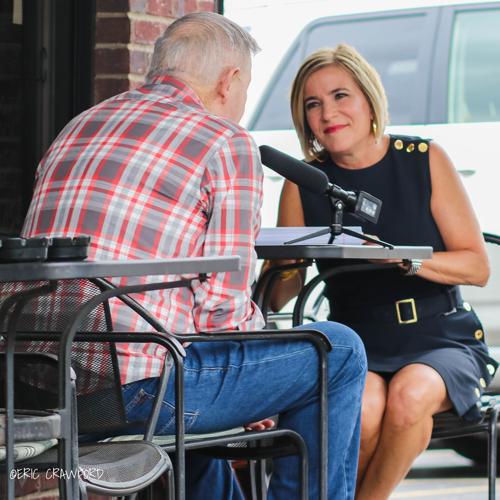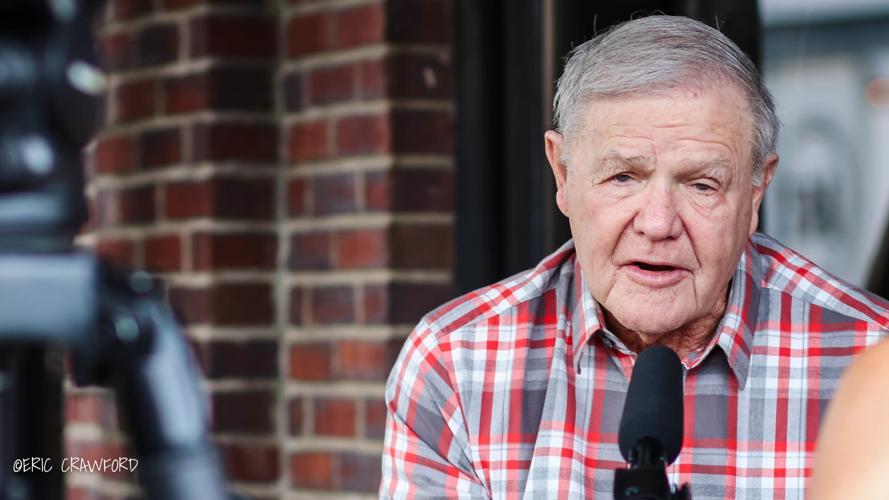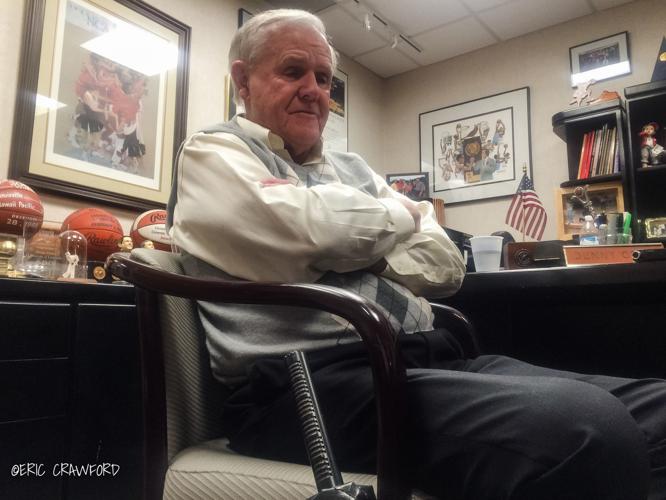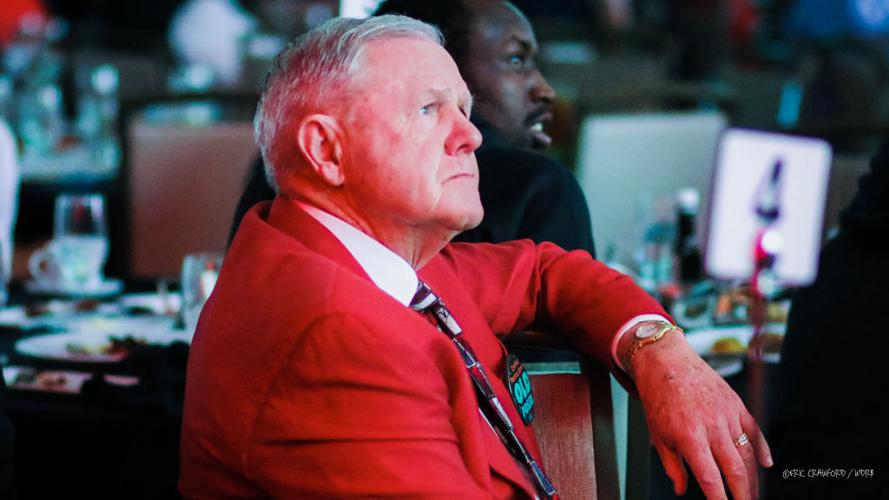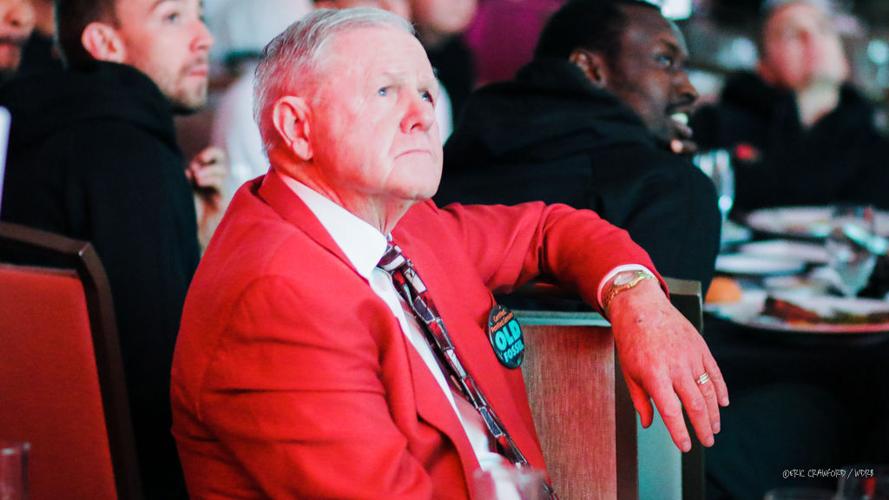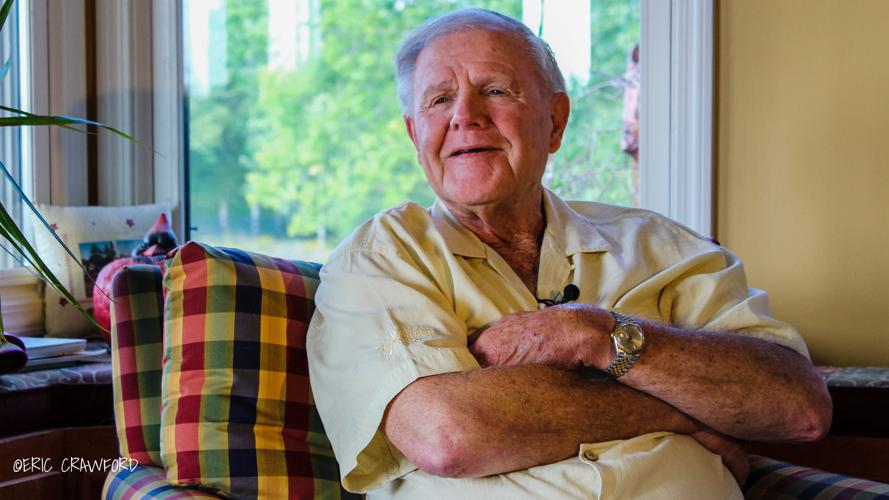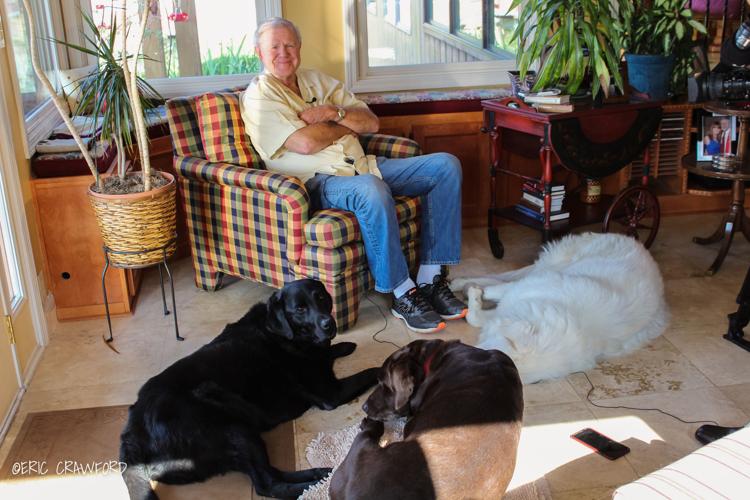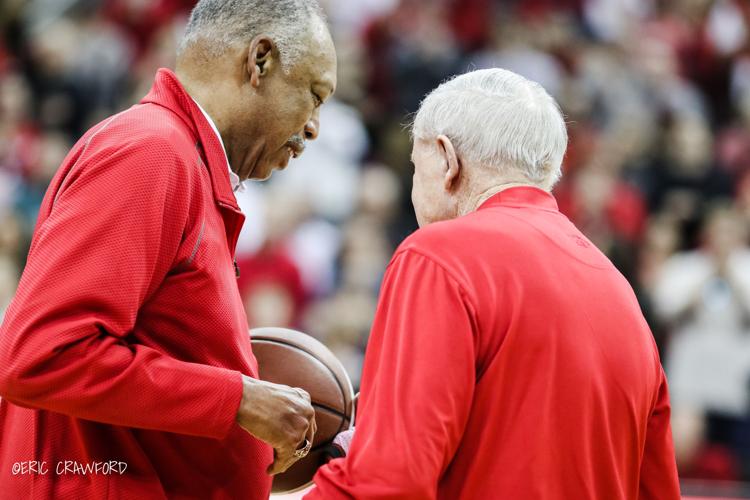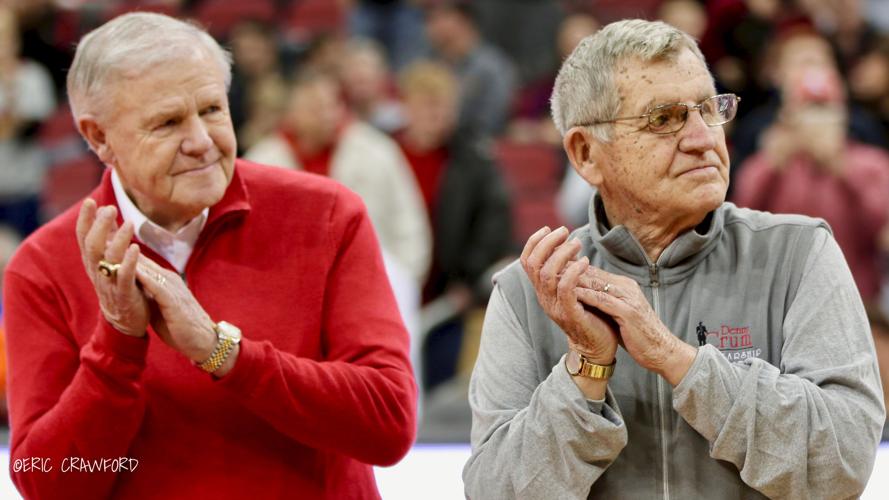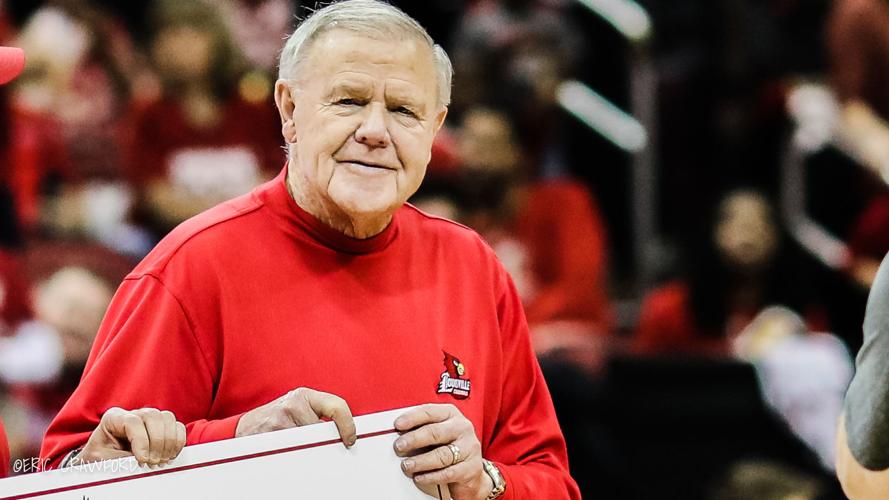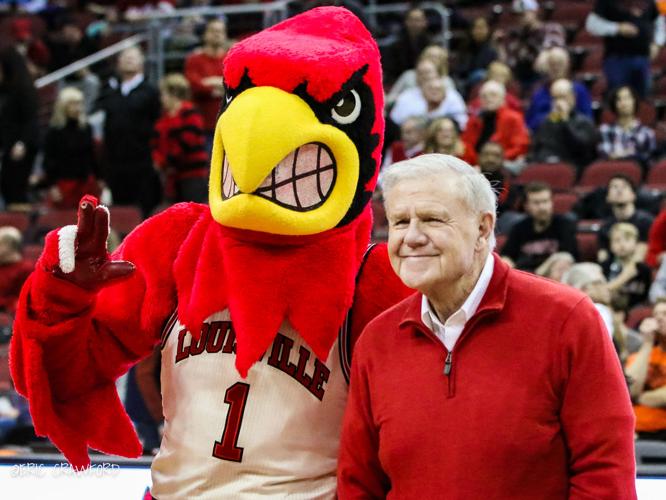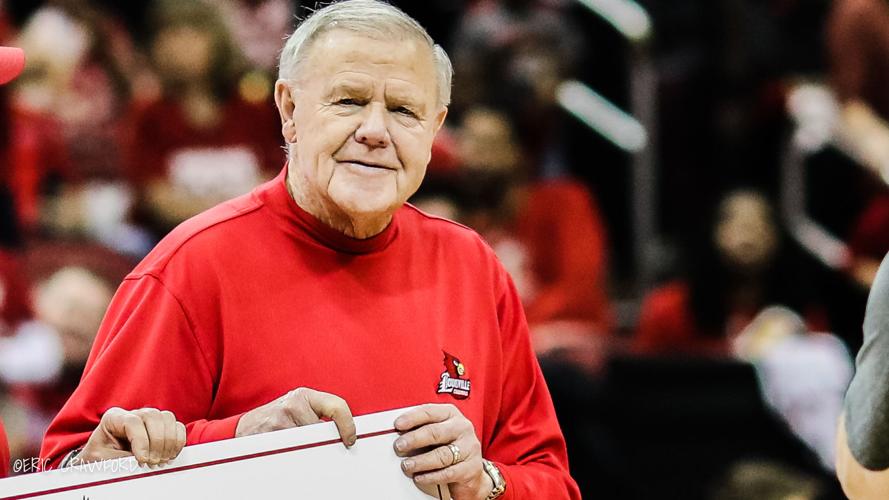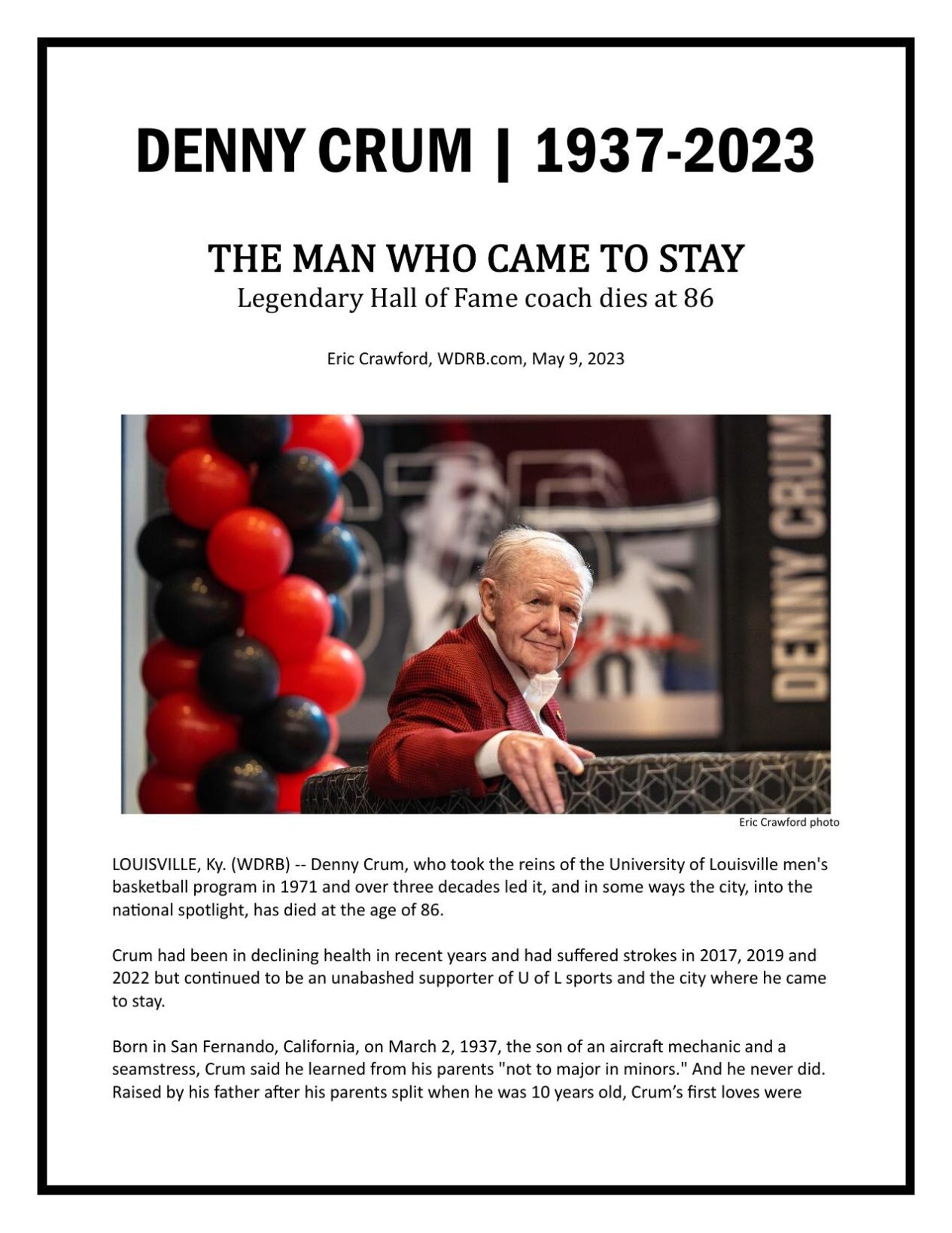LOUISVILLE, Ky. (WDRB) -- Denny Crum, who took the reins of the University of Louisville men's basketball program in 1971 and over three decades led it, and in some ways the city, into the national spotlight, has died at the age of 86.
Crum had been in declining health in recent years and had suffered strokes in 2017, 2019 and 2022 but continued to be an unabashed supporter of U of L sports and the city where he came to stay.
Born in San Fernando, California, on March 2, 1937, the son of an aircraft mechanic and a seamstress, Crum said he learned from his parents "not to major in minors." And he never did. Raised by his father after his parents split when he was 10 years old, Crum's first loves were football and basketball. But a tall boy moved in across the street, and Crum began playing basketball with him.
Two simple acts of fatherhood left a mark on Louisville history. Crum's father, Alwin, put up a basketball goal in the back yard. Then, with his son ever passionate about the game, he put up a light. Denny would play well into the warm California nights until neighbors poked their heads out of the windows to tell him to go to bed. But a dream had been born.
Crum's life accomplishments would fill a rolled-up program. Two-time national champion. Six Final Fours. Inducted into the Naismith Memorial Basketball Hall of Fame in 1994. He lived to see the court that Cardinal teams play on, the Central Avenue overpass on campus, and a new dorm at the university named after him. In 2022, he welcomed one of his former players, Kenny Payne, into the U of L coaching seat he occupied for so long.
But his legacy for the school and city runs even deeper.
Louisville's basketball success did not begin with Crum, but he is the central figure of the university's sports history. And even that isn't saying enough, considering that the growth of the university, and for that matter, the emergence of the city of Louisville itself, were concurrent with the growth and success of Crum's basketball program. Some have said his program's success was a catalyst for those things. And Crum was the one who flipped the switch.
For thirty years, he was the face of U of L, and even in his retirement he maintained an honored presence.
At his 85th birthday celebration, on March 2, 2022, friends, former players, fans and family gathered to pay tribute to his singular U of L life, eating potato soup that he had helped prepare, with proceeds from its sale going to The Denny Crum Scholarship Foundation, which raised more than $1.5 million to endow scholarships at the school over the final decades of his life.
"He is U of L," said one of his former players, Darrell Griffith. "Most people in this city can't imagine the place or the city without him."
Another former player, Roger Burkman, said, "Sometimes I think we take people for granted, and I think Coach Crum is one of those. And the reason I say that is he's always been there for all these years, for all of us, for this university, and for this community. He's that humble guy that you would never know was a legendary superstar of a basketball coach. He's that loyal — let me repeat that, loyal — friend that's generous and kind to everyone."
COOL HAND LUKE
Al McGuire, who coached against Crum for years at Marquette before becoming a basketball commentator for NBC, called Crum, "Cool Hand Luke." And nobody was cooler than Crum, especially in the decade of the 1980s, when he rolled in astride college basketball's hottest program and led it to four Final Fours and two NCAA championships between 1980 and 1986.

Denny Crum talks to his team during an NCAA Tournament game in March, 1995.
The university and athletic department that emerged from that period were markedly different from the ones that entered it. It's not that the school hadn't had success before. But the Crum years changed its perception, first in its home state, and then around the nation. The athletic department had a $2 million budget in 1980, and that was largely subsidized by the university. Coming out of those years, the budget was nearly $6 million, and the athletic department was self-sufficient.
Behind the basketball program's national TV appearances, Louisville athletics director Bill Olsen built cash reserves approaching $40 million, a war chest that was used to help begin the massive round of facilities spending that sparked the university to bigger and better conference affiliations.
"I don't think there's any question it changed a lot of things," Crum told Louisville public radio station WFPL in April of 2013 when asked about the basketball program's success. "I think giving was way up to the university and it's continued to be that way. I think nationally, it gave us a little foothold. In the eighties, I think we were in four Final Fours and won two championships. No one else did that during the eighties, so I think that really put us on the map."
And it made Crum a Louisville icon, right along with Muhammad Ali, Louisville Slugger and the Kentucky Derby.
Longtime Louisville mayor Jerry Abramson, who went to Washington to serve under President Barack Obama after a stint as Kentucky's lieutenant governor, remembered a car ride from the airport toward downtown with President Obama. Abramson said he pointed out points of interest from the interstate, and when he pointed to Freedom Hall, Obama piped up and said, "Hall of Famer Denny Crum, he coached there. He had that guy Darrell Griffith with the 42-inch vertical."
EARLY YEARS
Crum arrived at U of L before the 1971-72 season after serving for four years as an assistant for legendary UCLA coach John Wooden, for whom he also played and served as a graduate assistant.
He was youthful and confident — some thought cocky — but laid back and charismatic. Peck Hickman, then the Louisville athletic director and himself an accomplished basketball coach at the school, said he didn't know what to make of the young Crum, with his sideburns and leisure suit.
"Then we interviewed him, Hickman said. "And he blew us all away."
Crum took Louisville to the Final Four in his first season.

UCLA coach John Wooden, right, and Louisville coach Denny Crum see something funny as they watch UCLA work out for their NCAA game with Louisville at the Sports Arena in Los Angeles on Thursday, March 22, 1972. Crum played for UCLA and then assisted Wooden three seasons through the 1970-71 campaign. (AP Photo/Harold Filan)
"Having come from UCLA, I just thought that's what you did," Crum said. "You played the season, then went to the tournament and went to the Final Four. I didn't have a good appreciation for how hard it was."
It didn't take long for Crum to stoke the flames of a rivalry with the University of Kentucky. Adolph Rupp, its Hall of Fame coach, had an all-white freshman class that included players like Jimmy Dan Conner, Mike Flynn, Bob Guyette and Kevin Grevey, and was rated No. 1 in the nation. When asked about Kentucky's class, Crum said, he was "not overly impressed" with any of them, and went on to say, "I wouldn't trade any of them for our two best freshmen at Louisville - Allen Murphy and Junior Bridgeman." He added that Murphy, "would eat any of the UK guys alive." UK fans were outraged, and the Lexington Herald, in an editorial, exclaimed, "Can you imagine the gall?"
Louisville fans loved it. They rallied behind his confidence. His defiant call for respect resonated with them, and would for three decades. And their numbers began to grow.
Crum coached man-to-man defense and mined the cities in the northeast and rural areas of the southeast for hidden gems. He liked big guards he could post up and long, athletic, interchangeable players on the front line who could switch everything defensively. He immediately installed the UCLA high-post offense. He developed a 2-2-1 full-court zone press and his teams became known for applying fierce pressure during a time when college basketball was coping with offenses that liked to run the four-corner "stall" game.
Manning the Cardinal sideline with his rolled-up program, Crum took the Cardinals to the Final Four twice in his first four years before landing Louisville prep standout Darrell Griffith in 1976. After a first-round loss, the Cardinals would make back-to-back Sweet 16 appearances before winning the 1980 NCAA championship.
THE DOCTORS OF DUNK
And that championship changed everything. From then on, there was a waiting list for Louisville season tickets. The school was able to negotiate with the state for a renovation of its home court, Freedom Hall, at the state fairgrounds. When the school needed state funding help for academic buildings in its effort to maintain its accreditation, Crum was asked to speak to the governor. The funding was approved.
From 1980-86, there was no more fashionable program than Louisville's. "The Doctors of Dunk" made back-to-back Final Four appearances in 1982 and '83. And in 1986, they won the championship again.
While Crum was the hottest coach in the game, he never was voted one of the major national coach of the year awards. Maybe that was because of his laid-back style, or maybe it was because his teams often started slowly, battled their way through brutal early season schedules and peaked late in the season, often after the award balloting had been settled. Whatever the case, he wasn't always accorded the public recognition to match his accomplishments. He battled the perception that he wasn't coaching hard, because he didn't rant and rave. His teams were very athletic but some thought they were undisciplined. Crum's success in close games, however, and his uncanny ability to draw up successful plays out of timeouts, said something different.
Crum's old mentor, Wooden, said of him, "He's not a showman. Some coaches want to be seen. I wanted people to come watch my players. I think Denny's that way."

Denny Crum with Darrell Griffith.
Crum recruited athletic players who made up interchangeable parts on teams that wore down opponents. He excelled in finding talented players, then giving them freedom to play. And he gave them freedom in other ways, too.
"He didn't treat you like a little kid," said David "Poncho" Wright, the splendid sixth man for Louisville's 1980 championship team. "He definitely let you be your own person."
After the 1980 championship, Crum tried to pressure Kentucky to play the Cardinals. No amount of public pressure could make that happen, but the 1983 NCAA Tournament did. In a CBS interview with John Tesh before that meeting in Knoxville, dubbed, "The Dream Game," because the rivals hadn't played since 1958, Crum told Tesh, "They won't play." When Tesh asked if it was because Kentucky was afraid, Crum said, "Well did you ask them that?"
"Well, we asked coach (Joe B.) Hall," Tesh said.
"And he wouldn't give you an answer, would he?" Crum said.
"Well," Tesh responded, "He tried to walk out of the interview, actually."
"Yeah," Crum said. "Well that's typical."
The regular-season series with Kentucky finally came about the following November, and it continues today.
Crum never expected to spend his entire career in Louisville. He thought he'd come for a few years, then go to UCLA when Wooden retired. But after Wooden left in the mid-1970s, Crum thought he had a good thing going. Then he won a title in 1980. More offers came, but he didn't leave. He won another title in 1986. He wound up staying 30 years in Louisville, and retiring from coaching after a few rocky seasons at the end of his career.
Crum's final year at the university was a difficult one, with bitter behind-the-scenes infighting spilling into the public in media exchanges. Only near the season's end was a retirement agreement hammered out.
"It was not a good process," Griffith said at the time. But in the words of then Courier-Journal columnist Pat Forde, "With every move and mannerism under acute scrutiny, Cool Hand Luke never betrayed a negative emotion," in the press conference to announce his departure.
After Crum's retirement from coaching in 2001, the school signed him to a job as special assistant to the president, which he held until he was let go in 2017. He remained a frequent visitor at basketball games and worked enthusiastically in support of the university.
Any proper understanding of U of L athletics has to begin with what Crum did, for 30 years, and with where the university was before he came and where it stood after he left.
There were difficult times. There were a couple of NCAA run-ins in his later years. But Crum received his biggest honor in 1994, when he was voted into the Naismith Memorial Basketball Hall of Fame in Springfield, Massachusetts.
POST-COACHING CAREER
For 10 years, he hosted a daily radio show with his old nemesis, Joe B. Hall, and spent his retirement fishing and hunting at his Montana ranch, traveling, and supporting numerous charity events in Louisville. He even took up competitive poker, where his opponents learned what his basketball opponents could already tell you -- he could read a game and play the percentages as well as anyone going.
And his investment in Louisville, often a footnote to his basketball accomplishments, moved to center stage.
Crum's connection to the city ran deeper than many probably knew. Much of his charity work went unpublicized. All anyone had to do was ask. One former player, Phil Bond, recently remembered that after the tornado super outbreak in April, 1974, Crum had the team go to the home of Bob Allison, a man whose house had been destroyed, to help with the clean-up.
"It really moves me and it moved all of us and we spent the whole day just helping clean up and pick things up," Bond said. "And Mr. Allison was so touched that we had a bond that lasted way past basketball his whole life."
Bond, who led Louisville in assists for three straight seasons before giving way to Griffith in the starting lineup his senior year, helped Crum to his second Final Four in 1975.
"One of the things I'll always remember was after we went to the Final Four and came back, Coach Crum had an offer to go back to UCLA," Bond remembered. "He had just bought a farm, and he took me out there to try to learn how to drive a stick shift, which I never learned how to do. But he told me, 'Phillip, I've decided to stay in Louisville. I'm not going to go to UCLA, because I really love this place, and I'm going to stay here and build something.' And that's what he did."
Crum did not build the modern-day U of L single-handedly. But he made a hefty down payment on it.
In his later years, the university and city found new ways to celebrate him. At the dedication for Denny Crum Hall on campus in 2022, fans old and young sat next to him, snapping photos. Crum, his health already failing, didn't speak, but smiled through it all.
In March of this year, a new "Louisville Legends" banner was hung across from the KFC Yum! Center along Second Street for all to see as they enter the city's downtown. It says, "Denny's Louisville." It certainly is. Crum, by then unable to appear in public, was not present.
"But I know," Griffith said, "Coach would appreciate all the love he's been shown."
He suffered a stroke while in Alaska in 2017 while on a fishing trip with his wife, Susan, and friends. But he bounced back from that and continued an active life that included fund-raising and appearing at various university events.
After athletic director Tom Jurich and coach Rick Pitino left the stage, he enjoyed a renewed relationship with the men's basketball program, first under acting coach David Padgett, then under new head coach Chris Mack. He hosted team gatherings in his home and was a frequent visitor to practice.
Crum suffered a second stroke in mid-May 2019, and was hospitalized for several days in Louisville.

Denny Crum with Louisville's Cardinal mascot at Louisville Live at Churchill Downs in 2021.
Just days into the rehab for that event, Crum checked himself out and finished at home. Doctors told him he needed occupational therapy. "I don't need a job," he quipped. "I just want to go home."
And, as he did everything else, he finished his rehab on his own terms. In this case, it was at home in Eastern Jefferson County, with his deer stand out in a field beyond the house, where he liked to climb and watch the deer and birds move across his property.
It was there that he spent his final months, with Susan, and a parade of former friends and players visiting his bedside.
In one of Crum's last appearances in the KFC Yum! Center, he came down to the court to present retiring Duke coach Mike Krzyzewski with a Louisville Slugger bat. Krzyzewski, himself a Hall of Famer and five-time national champion, said he was more moved by seeing Crum than by the gift. The two faced each other in the 1986 NCAA championship game.
"You could not have honored me in a higher manner than to have Denny -- I'm going to get emotional," Krzyzewski said. "He's one of the true icons of the game and someone that I've admired my entire life, when he worked for Coach (John) Wooden, and then the amazing job he did here. And anyway, that was really -- I hugged him a few times you guys, you don't get a chance to be with people of that level. But that was really a great thing. ... He's one of the iconic coaches in the history of our game. And, look, he stayed with you all in Louisville, right? I mean, he helped build this culture, or built it, and what class and dignity, and he stayed here."
If you'd like to print off a commemorative version of this story, click here.

Scenes from the dedication of Denny Crum Hall on the campus of the University of Louisville on Sept. 29, 2022.
Related Stories:
- 'Rest in peace' | Louisville community, college basketball world laments death of Denny Crum
- BOZICH | Denny Crum came, conquered, stayed, becoming Louisville icon
Copyright 2023 WDRB Media. All Rights Reserved.
